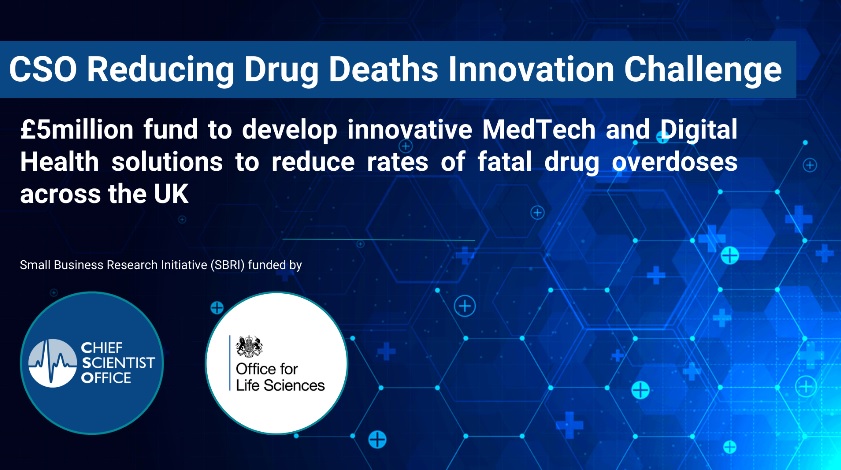Reducing Drug Deaths Innovation SBRI Challenge Phase 1 Projects Awarded

A new challenge funded by the Chief Scientist’s Office and UK Office of Life Science aimed at reducing fatal overdoses and drug-related harms through the development of innovative technologies has been launched. NHS Fife, part of the Health Innovation South East Scotland (HISES) Innovation Hub has been chosen to manage and coordinate the UK wide Reducing Drug Deaths Innovation Challenge.
This funding supports wider government initiatives to tackle drug misuse in society. The UK’s drugs strategy, published in December 2021, has a key objective to prevent 1,000 drug deaths in England by 2025. This aligns with work within and across the 4 nations of the UK to improve systems of support and reduce drug-related deaths. The Addiction Mission, as part of this strategy, is aiming to enhance the UK-wide research environment and incentivise the development of innovative and effective new treatments, technologies and approaches to support recovery, and reduce the harm and deaths addiction can cause.
The projects will be delivered across all four nations with support from additional NHS Scotland Innovation Hubs, The Academic Health Science Networks (AHSNs) in England, The Welsh Ambulance Service and the Drug and Alcohol Research Network (DARN) in Northern Ireland.
This funding supports wider government initiatives to tackle drug misuse in society. The UK’s drugs strategy, published in December 2021, has a key objective to prevent 1,000 drug deaths in England by 2025. This aligns with work within and across the 4 nations of the UK to improve systems of support and reduce drug-related deaths. The Addiction Mission, as part of this strategy, is aiming to enhance the UK-wide research environment and incentivise the development of innovative and effective new treatments, technologies and approaches to support recovery, and reduce the harm and deaths addiction can cause.
Eleven projects have been awarded up to £100,000 each to launch 4-month feasibility studies to develop prototypes, with one additional project securing up to £500,000 for a year-long demonstration study to collect real-world evidence across the UK.
Three of the projects are currently being evaluated within the HISES Innovation test bed;
- RescuePatch: a controlled-release combination patch for naloxone and flumazenil delivery – MESOX LTD in partnership with Health Innovation Southeast Scotland (HISES), Aston University, the National Physical Laboratory and On Target Pharma. This project will investigate a novel transdermal patch combination therapy called RescuePatch. The patch will contain a reservoir of antidotes to both opioid and benzodiazepine overdoses ad is designed to be applied by a non-professional, which is expected to improve responder pathways and increase the chance of patient survival.
- Improving Harm Reduction Strategies for Illicit Drug Use: a Handheld Device for self-monitoring Benzodiazepine use – ZiO Health Ltd working with Health Innovation South East Scotland (HISES). ZiO-Health’s feasibility project is focused on improving harm reduction strategies for illicit drug use by developing a handheld therapeutic drug monitoring (TDM) device to notify users and responders of potential overdose.
- Saving SAM: System for Alert and Monitoring of Potential Overdoses – eMoodie in partnership with the University of Edinburgh and NHS Scotland Health Innovation South East Scotland (HISES). This project will design and develop Saving SAM: an AI-enabled drug overdose monitoring system to enable both self and responder digital alerts
The details of the other Awardees throughout the UK;
- DoseCare: Development and Evaluation of a Wearable-Integrated, AI-Powered Overdose Detection and Response System – Manchester Metropolitan University in partnership with Queen’s University of Belfast, Drug and Alcohol Research Network (Northern Ireland) and the Salvation Army. This project aims to harness the power of AI to revolutionise overdose detection and prevention mechanisms in healthcare. By focusing on 2 distinct user groups with varying levels of risk awareness, they intend to develop tailored solutions that significantly improve patient outcomes and enhance overall care delivery utilising wearable technologies and smart phone applications.
- Ultra-portable fast-dispersal buccal naloxone for constant carriage: testing feasibility and acceptability – King’s College London in partnership with Catalent, Accord Health, Scottish Drug Forum, Scottish Families affected by Alcohol and Drugs (SFAD), DrugFAM, the Health Innovation Network and the South London Academic Health Science Network (AHSN). Naloxone is an opioid overdose antidote, however, existing naloxone products are bulky and have very low carriage rates. This feasibility project will examine a proposed ultra-portable fast-dispersal naloxone tablet suitable for constant carriage, so that it is always present with an individual who is present at an overdose emergency.
- LifeSavr: Unobtrusive Wearable Device to Detect Overdose – NOMW Health Limited in partnership with the University of Southampton and NHS Scotland West of Scotland Innovation Hub. The study will focus on assessing the technical, economic, and operational aspects of the ‘LifeSavr’ device, which uses advanced sensor technology to provide real-time detection of opioid overdoses
- Drug Overdose Detection and Response using Care and Respond with CHAI999 – led by Science and Engineering Applications Ltd in partnership with Welsh and Scottish Ambulance Services. This project aims to explore the functionality of digital tools that can empower friends and family to support drug users and respond in the event of an overdose and link with emergency services to facilitate a co-ordinated response.
- Vivisco Smart Revive Beacon for Opiate Overdose – Vivisco in partnership with the Kent Surrey Sussex AHSN, Forward Trust, Kent County Council and the Southeast Coast Ambulance Service NHS Foundation Trust. Vivisco will work with organisations in Kent to co-design and prototype an automatic alert system to contact emergency services with GPS location and type of antidote used that is triggered when a naloxone package is opened.
- In Time Naloxone – DroneMatLab Limited (King’s College London spinout) in partnership with the National Programme on Substance Abuse Deaths, HeroTech8, Midlands Partnership University NHS Foundation Trust, University of Southampton and Wessex Academic Health Science Network. The project aims to develop an effective emergency response for the distribution of naloxone (an opioid overdose antidote), by drone to prevent opioid overdoses becoming fatal.
- Co-Evaluation Study of Overdose Detection and Response Wristband Technology – Midlands Partnership NHS Foundation Trust (MPFT) in partnership with Brave, Keele University, Two Saints Housing Association and the West Midlands Academic Health Science Network. To combat the growing problem of self-administrating drug users from overdosing, a multi-organisation collaborative led by MPFT propose to develop a wearable piece of technology that detects absence in user movements and alerts the individual or surrounding people to need for intervention.
- A soft skin-interfacing strain sensor for overdose detection and prevention (ASSESSOR) – University of Glasgow in partnership with NHS Scotland West of Scotland Innovation Hub. The aim of this project is to develop a low-cost skin-interfacing sensor that can be seamlessly attached to the human body for long-term and remote monitoring of mechanical and physiological signs of overdose without affecting the routine daily activities of the user.
- RESCU2 – Clinical Validation of Virtual Safe Drug Consumption Technology – PneumoWave (formerly Altair Medical Ltd) in partnership with the University of Dundee and King’s College London, alongside third sector partners including Humankind, Thames Reach, Hillcrest Futures, the Health Innovation Network and the Academic Health Science Network (AHSN) for south London. PneumoWave ALERT is a remote monitoring platform designed to make opioid usage safer. A discrete, chest-worn biosensor paired to a mobile device allows detection of the onset of life-threatening respiratory depression during an overdose event which then alerts nearby carriers of naloxone, and emergency medical services. This project will recruit 200 residents of homeless accommodation to participate in a study with aims of reducing drug deaths and gaining usability feedback from patients and care teams.

